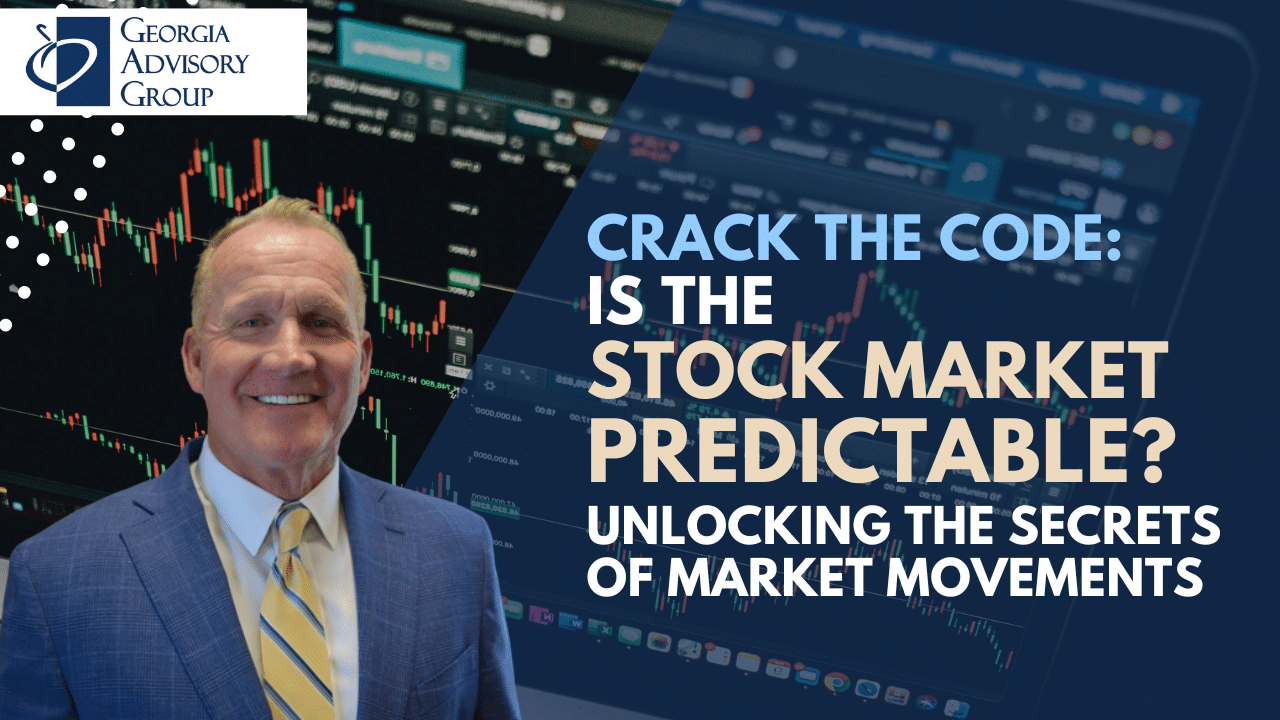Crack the Code: Unveiling the Secrets of Stock Market Predictability
Is the stock market price movement random or predictable? And are you disciplined enough to stick to a plan?
In the 40-plus years I’ve been engaged in the business of managing stock portfolios for clients, I’ve never given up my search for the Holy Grail of stock picking. Hello, Dave Dooley here with Georgia Advisory Group, a full-service judiciary firm where we outsource nothing. Meaning, our team handles all positions and trades in-house, and we don’t offer cookie-cutter portfolios. It takes work, but that’s why you hired us in the first place.
Going back to the ’80s, I experimented with neural nets, the predecessor of artificial intelligence. I concluded that the market was like a giant Ouija board, where millions of hands were on the board, moving about. While it’s very hard to predict the simultaneous thoughts of millions of people with different perspectives, the effort of trying to understand human behavior patterns was interesting.
In the ’90s, we leaned towards quantitative analysis, the use of complex mathematical and statistical modeling. Then, we shifted to purely fundamental analysis, studying undervalued or overvalued companies based on their sales and earnings. Lastly, we explored technical analysis, studying charts and the repetitive nature of price movements.
Now, my conclusion was that all these methods worked at times, but none worked all the time. So, where does that leave us? Are stock price movements random, or is there a way to predict them? The answer is found in long-term studies of historic pricing movements. If you look at long-term charts, particularly in indices like the Dow Jones or the S&P 500, you’ll notice that the market has a definite bias to the upside. When the chart covers decades, the price movement is mostly up, with the occasional dip. This makes me conclude that if you’re a long-term investor, your prospects are very good, almost guaranteed to make money.
Now, there are several common characteristics of companies that grow over time: consistent earnings and sales growth, revenue and earnings growth leading to increased shareholder value, leadership in their industry, and companies that seem to be more innovative and are the darlings of their industries. Focusing on institutional interests is also important, as 401K plans, pension plans, and large money managers buying large blocks of stocks tend to move the market.
These commonalities are fundamental in basis, and while they do well over time, it is not uncommon for them to have rough patches along the way. In our research for a method of handling clients’ assets, we realize that one needs to stay flexible and implement more than one strategy to meet the expectations of our clients. Owning individual companies and very narrow ETFs, and not mutual funds, is the way to go based on historic criteria from any viewpoint that I mentioned above.
I will go into a little more depth of our method. However, in the past two years with the advent of COVID-19, the rise in inflation and interest rates, and supply chain issues, we concluded that there was very little we wanted to invest in. Therefore, we parked 60% of our clients’ money in short-term U.S. Treasuries, paying 5%, rather than risk losing money.
One of our filters for possible stock candidates is to screen for companies that are trending up and have posted three consecutive weeks of positive returns. While there are other parameters we look for, this allows us to refine the universe of stocks down to the ones that are trending in the right direction. While this isn’t foolproof, it has given us success with Meta and Nvidia this year, which have performed extremely well, enough to overcome any positions that didn’t appreciate to our liking.
One of the instruments we have used more frequently than other advisors is the use of options. We use options to buy stocks cheaper, generate income, and implement some degree of downside protection on the stocks that have performed unusually well. While we don’t have a crystal ball that works well, and we continue to search for the Holy Grail of stock picking, we have concluded the following:
Are stock price movements random, or are they predictable? The answer is they’re emotionally predictable in the longer term. So long as you purchase assets that meet the three criteria mentioned above on the short term or medium term, if you closely monitor momentum, relative strength versus other stocks, and double-check their earnings and sales, you can predict the ones that have a chance of shorter-term moves. If you can predict around two out of five that are moving up and sustain that movement, then the use of options to secure as much of the gain as possible is a great move. You have a good chance to make more money than any other method we have come across in the past 40 years.
The only thing you can’t do randomly is to follow TV stock forecasters, use hot tips from your workmate, and jump in and out of stocks out of fear or greed. Most advisors, first and foremost, do not even handle your money. They outsource it and have no specific plan. Rather, they immediately place you in specific funds that they like, which are so broad-based that your chances of outperforming statistically are very poor. That is why the argument for just buying an index most likely is good advice for the ignorant investor, which unfortunately makes up around 85% of the retail market.
When I ask prospective clients or those who are handling their own accounts what exactly is their specific strategy in acquiring good companies to own at any given time, the replies are almost comical. You ask a friend who is heading to Las Vegas what their plan is, and their first response 95% of the time is not to lose more than a certain amount of money. Now, what kind of plan is that?
Make sure your advisor and the firm you are thinking about working with can walk you through exactly their approach to growing and protecting your family’s finances. If we can help, go to our website and look around at the countless videos we have to help you be a better and more knowledgeable investor. While you’re there, sign up for our weekly videos, or you can click subscribe below. Till next time.


